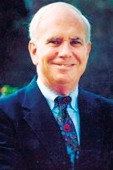Cal Poly celebrates Earth Day, takes steps to preserve environment
By Katie Hofstetter
April 10, 2006
World-renowned environmentalist Peter Raven encouraged Cal Poly students and staff to inform the public about global sustainability in his lecture “Biodiversity, Sustainability and the Modern University” on Friday night.
Raven, who was named “Hero of the Planet” by Time magazine in 1999, came to Cal Poly in preparation for Earth Day on April 22. His visit was sponsored by the Provost’s Office.
In his lecture, given to an audience of approximately 1,000 people, Raven called on the school as a whole to set an example in moving toward global sustainability.
“Particularly appropriate to Cal Poly, we can improve the technologies we use, which themselves have an alarmingly tough impact throughout the world,” he said.
During his visit to San Luis Obispo, Raven toured Cal Poly facilities as well as organic vineyards in Edna Valley and the San Luis Obispo Botanical Garden.
Raven attended UC Berkeley for his undergraduate and received his doctorate from UCLA before teaching at Stanford for nine years. A California native, he praised the San Luis Obispo environment.
“Here it’s the mixture of Northern and Southern elements growing together that make it so incredibly exciting biologically,” he said.
But Raven warned about what the current state of consumption worldwide, and especially in the United States, will eventually mean for the planet. He estimated that half of the world lives on less than $2 a day while one-eighth of the population could be considered starving based on caloric intake.
He also predicted that another 2 billion people will be added to the world’s population before there is global sustainability.
“We will reach sustainability at some point. We have to,” he said. “I think the choice we have to make is will it be a soft landing or will it be a hard landing? Are we going to be clever enough to be limiting population, to be figuring out better and less wasteful ways to consume? Will we be finding better technology to use so that we can find this sustainable condition while this earth is still rich and diverse and beautiful?”
Raven said to conquer the problems contributing to the earth’s destruction, individuals must promote international understanding, learn, vote and act practically and politically.
“It’s extremely important to learn,” he said. “The only way to learn effectively in these fields is by doing.”
Raven’s speech is part of Cal Poly’s implementation of the Talloires Declaration, signed by President Baker in 2004 and designed to educate students on the depletion of natural resources. The adoption of the declaration puts Cal Poly in the company of some 350 other universities dedicated to global sustainability.
“I wasn’t aware of how much our school is involved in sustainability,” said junior biology student Aneesa Masters.
Prior to Raven’s speech, Dean of the College of Agriculture David Wehner spoke of the environmentally sound steps being taken by the college. He cited the addition of environmental protection management and earth science majors, as well as research into improved grazing practices and reduced erosion, as a few of the ways the college is working toward sustainability.
Wehner also announced in the fall that the name of the College of Agriculture will be expanded into the College of Agriculture, Food and Environmental Resources.
Raven called the College of Agriculture’s commitment to sustainability “wonderful” and “ingenious.”
He estimated that since 1950, soil erosion has increased 20 percent, there has been a 20 percent loss of agriculture land, more than one-third of forest land has been destroyed, carbon dioxide has increased by one-sixth and 6-8 percent of the ozone layer has been depleted.
Raven also said that by the year 2100 about two-thirds of the earth’s 10 million organisms will be extinct, with the current extinction rate at 1000 per year.
“People being informed about organisms will not only be able to deal with them more intentionally and successfully, but they will actually care about them, they’ll get more attached to them,” he said.
Raven concluded his lecture to a standing ovation by the audience. There was another eruption of applause when Raven quoted Mahatma Gandhi who said, “The world provides enough to satisfy every man’s need but not every man’s greed.”

